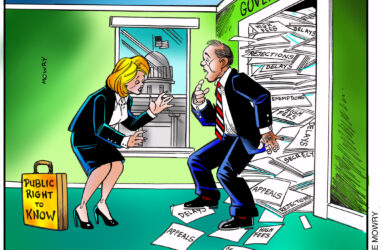Hey, how much are you paying in school taxes again?
Do you deserve to know what is going on in the school district you help fund — in the schools your kids go to?
Do you believe in your right to know; do you believe in the free press, in the First Amendment to the United States Constitution?
Yeah, so do we.
But at the monthly Creswell School Board (CSB) meeting on Wednesday, March 14, The Creswell Chronicle was unjustly kicked out of an executive session.
In all its irony, this misconduct actualized during Sunshine Week, a national initiative spearheaded by the American Society of News Editors to educate the public about the importance of open government and the dangers of excessive and unnecessary secrecy.
We know our rights. The Chronicle called foul and Ball Janik LLP Attorney Jack Orchard, who specializes in Public Meetings Law, backed us up. Orchard represents Oregon Newspaper Publishers Association and all its members, to which The Chronicle belongs, and for which Chronicle Owner/Publisher Scott Olson serves on the board.
Orchard confirmed that Creswell School Board violated Public Meetings Law. Period.
“There are only a couple instances where media can be excluded from an executive session, and I don’t believe either one of those instances listed qualify for The Chronicle to be excluded from that executive session,” Orchard said.
We want the community to understand the gravity of this situation. This isn’t just a mere spat between The Chronicle and Creswell School District board members; no, it goes much deeper than that. Creswell School Board robbed The Chronicle of access to information we had a right to. This, in turn, robs you, citizens of the community, of your right to be informed.
By attempting to keep their deliberations hidden from public scrutiny, Creswell School Board brings their own ethics into question. Actions of governmental secrecy stir cynicism, erode public trust and discourage community involvement. As citizens of this community, it is your right to ask questions, to hold officials responsible and to demand answers.
Not a single board member spoke up after Chair Mike Anderson unrightfully insisted The Chronicle leave. School Board Vice Chair Tim Rogers and directors Natalie Smathers, David Eusted, Lacey Risdal and Paul Randall have all been trained on Public Meetings Law.
The Boardsmanship for Oregon School Board Members document explicitly states that a board member is to, “Recognize that the board must comply with the Public Meetings Law and has authority to make decisions only at official board meetings”; and, “Insists that all board and district business is ethical and honest, is open, fair and honest — has no hidden agenda.”
The fact that no one challenged or even questioned Chair Anderson’s call, that no one spoke up, speaks for itself.
ON THE AGENDA
There were two items slated on the executive session agenda, and neither of them would give Anderson the authority to dismiss the media from the room, Orchard confirmed.
The two items being discussed were, “to hear complaints or charges brought against a public officer, employee, staff member or individual agent who does not request an open hearing – pursuant to ORS 192.660(2)(b), and “to consider information or records that are exempt by law from public inspection – pursuant to ORS 192.660(2)(f).”
According to the Meetings Manual, the Public Meetings Law expressly states that representatives of the news media shall be allowed to attend all executive sessions, except in these situations: for labor negotiations and to consider expulsion or matters pertaining to a student’s confidential medical records.
Creswell School District even preaches these same policies on their website. Yet Anderson still demanded that “even the media” had to leave this executive session, despite the fact that it had nothing to do with labor negotiation, student expulsion or medical records.
HOW PUBLIC MEETINGS LAW WORKS
Public Meetings Law explicitly states that media representatives are allowed in executive sessions, but are not allowed to report what happens during those sessions. According to the aforementioned Meetings Manual, the principal purpose of this practice is to “provide the media with an opportunity to obtain, from their attendance at executive sessions, background information that would improve their understanding of final decisions, and consequently, their ability to keep the public better informed.”
Furthermore, there is no rule prohibiting journalists from following up on information acquired in executive session, and if that information is discussed outside of that meeting or during open session or can be independently confirmed, it is fair game to reporters.
Having the media present at executive sessions also puts pressure on government entities to follow the rules; we are the “community watchdogs,” after all, and take that responsibility seriously. Governing bodies such as school boards are prohibited from making final decisions in executive session; yet we cannot confirm nor deny that the school board followed the rules in the executive session, because we were denied access.
Actions taken by Creswell School Board at last week’s meeting suggests that the board has no regard for transparency, no regard for the community they serve. Public Meetings Law was put in place to protect citizens; Creswell School Board’s actions suggest they are only trying to protect themselves.
WHAT WE’RE DOING ABOUT IT
The Chronicle met with Superintendent Todd Hamilton last Thursday, who suggested the Oregon School Board Association (OSBA) follows its own sets of rules.
We checked. They don’t.
“The Public Meetings Law applies to meetings of the ‘governing body of a public body,’” the Attorney General’s Public Records Meeting Manual states. “A ‘public body’ is the state, any regional council, county, city or district, or any municipal or public corporation… is also a board, department, commission, council, bureau, committee, subcommittee or advisory group of any of the entities in the previous sentence. The meetings law binds not only the state, but also cities, counties and other public bodies despite any contrary provisions of their charters, ordinances, rules or bylaws.”
Hamilton said that Chair Anderson conferred with OSBA and the District’s attorney sometime prior to the executive session, stating that these entities offered the advice to prohibit media access to last week’s executive session.
This reporter contacted Anderson for comment last Thursday, but he did not return that call by press time Tuesday.
Alex Pulaski, communications director at OSBA said that the association, “cannot comment on what advice was or was not given,” on this matter with the District because client communications are exempt from disclosure. The Chronicle has yet to find evidence to support or deny the claims made by Anderson because of this exemption, but it is of note that the District has yet to be forthcoming with that information on their own.
It is the media’s right to obtain information that was unlawfully withheld from them, Orchard said. The Chronicle called on Hamilton to hand over any minutes and audio recordings of that meeting, as well as all printouts or materials passed out at that meeting on Thursday, but yet to no avail.
Hamilton suggested The Chronicle write our request for those executive materials to the board secretary, Marilyn Cruzan, who would then forward it to the appropriate people. The Chronicle did so last Thursday and no communications were received back.
The Chronicle reached out again on Monday afternoon, letting the board and Hamilton know The Chronicle would be moving forward with an article in this week’s edition. Hamilton and Anderson then agreed to meet up after presstime on Wednesday, March 21, to go over the materials from that session.
The Chronicle will continue to request access to all materials from that executive session until we are granted access to this information.
WHAT YOU CAN DO ABOUT IT
Creswell School Board meetings are typically held the second Wednesday of each month at 7 p.m. in the District Office at Creslane Elementary School, 998 W. A St. These meetings are open to the public, but most commonly, no community members attend. The only people who attend these meetings are almost always exclusively District employees and a representative from The Chronicle.
It is in the best interest of the community that citizens fill those chairs to see for themselves how the school board operates. By attending these meetings, and if the meetings are run properly, citizens have access to the process of deliberation, which enables you to see your government at work, and to influence its deliberations. Attending meetings as such can offer a new perspective, and will show civic engagement and encourage others to get involved.
The next meeting will be Wednesday, April 11 at 7 p.m.
It is also imperative that disgruntled community members make their voices known, and are willing to stand by their opinions and by their experiences with the District. The Chronicle has seen many walk-in community members who are aggrieved by members or practices of the Creswell School District, but The Chronicle is unable to follow through if the community member won’t agree to go on record about the matter.
We believe the Creswell community deserves to understand why Creswell School Board believes they can operate behind their own deliberately drawn curtain.
We believe the Creswell community deserves to know why the board felt the need to quietly navigate those conversations at that executive session.
We believe the Creswell School Board needs to take responsibility for their misconduct, for their deviation from the law, for misusing the community’s trust in governmental transparency.
CHECK IT OUT FOR YOURSELF
— Attorney General’s Public Records and Meetings Manual
https://goo.gl/vm8myy
— Creswell School District Executive Sessions Policy
https://goo.gl/oWS4eD
— OSBA Board of Operations for Public Meetings
https://goo.gl/N5GnX1
— OSBA Public Meetings Handout
See Media Attendance
https://goo.gl/nmk7gT
— Quick reference guide to Oregon Public Laws
https://goo.gl/PXQKqa
— Attorney General’s Public Records and Meetings Manual breakdown
See II. E.4. Media Representation at Executive Session
https://goo.gl/G9qzb9
— The Federal Freedom of Information Act
https://goo.gl/GnViGN
— The Government in the Sunshine Act
https://goo.gl/9yto3u






